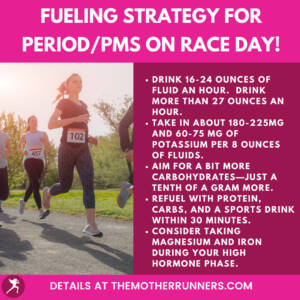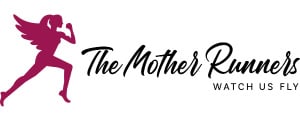Getting your period during your marathon can be a performance enhancer. But the days leading up to your period can be a drag. Changing your fueling plan to include more sodium and carbohydrates can help keep Aunt Flo and her impending visit from ruining your race day, says registered sports dietitian Megan Robinson. She shares how to fuel for performance during your period and PMS.

Reviewed by Megan Robinson, RD — In the past few months, I had several athletes who have ended up running marathons in the first or second day of their periods. Not ideal! For some, getting your period on race day isn’t a big deal. But for others, it can really tank your performance which really STINKS after months of hard work. But how you fuel can make a difference.
I connected with running coach and registered sports dietitian Megan Robinson on how to change your marathon fueling plan to keep your period or PMS from hurting your race day performance.
Skip ahead:
- First, a quick overview of your period:
- What changes from menstruation can affect running performance?
- How does getting your period during your marathon change how you would fuel?
- Should I eat more carbohydrates if I run a marathon on my period?
- Should I drink more fluids if I run a marathon on my period?
- Should I drink more electrolytes if I’m on my period during my marathon?
- What should I eat after I run a marathon on my period?
- Do I need more iron on my period?
- Should I take magnesium on my period?
- Key Takeaways If You Get Your Period on Marathon Race Day
If you are looking for a full range of advice on how to run a race on your period, read here.
Also, check out:
- How Your Period Affects Your Running
- Is it Harder to Run Before Your Period
- Running & Menopause: A Survival Guide
- Should I Run a Race on My Period
- What to Eat On Your Period

First, a quick overview of the phases of your menstrual cycle:
- Phase 1: Menstruation: Your period starts day 1 of your cycle. The period is the shedding of the uterine lining. Hormone levels of estrogen and progesterone are low, potentially making you primed to perform.
- Phase 2: Follicular phase: This phase is between the first day of your period and ovulation, which typically happens around day 14. During this time, oestrogen levels rises and peaks as an egg prepares to be released. When your period is done, the uterine lining begins to build back up again.
- Phase 3: Ovulation: This is when the egg is released from the ovary. It typically happens around day 14 (mid-cycle) and hormones like estrogen are at their peak, leading to some PMS symptoms. Ovulation usually lasts about one day.
- Phase 4: Luteal phase: This is the time between ovulation and the start of your next period. Hormones including estrogen and progesterone rise and then drop when your period starts. Then the uterine lining either prepares itself to support a pregnancy or shed if there is no pregnancy.
Related: Should I Run a Race on My Period
So, if you are affected by hormone fluctuations, you’re likely to feel:
- crummy during ovulation (roughly day 14 of your cycle) and
- during your late luteal phase aka PMS, about days 24-28 of your cycle.
Note, menstrual cycles can last between 28 to 40 days.
What changes from menstruation can affect running performance?
Robinson explains that the biggest difference your menstrual cycle can have on your running performance is increased body temperature and decreased thirst perception during PMS.
Your body temperature is slightly warmer during the second half of your cycle while you don’t feel as thirsty—despite your fluid needs increasing. You will need to drink more, but not overdo it.
“Women tend to over drink during marathons fearing dehydration, leading to hyponatremia (low sodium levels) so it’s important to prevent losing up to 2 percent body weight when training to avoid dehydration, but to also add sodium to maintain normal blood sodium levels,” she warns.
Related: What to Eat On Your Period
How does getting your period during your marathon change how you would fuel?
During the high hormone phase of the menstrual cycle which is ovulation leading up to menstruation aka PMS, the menstrual cycle affects hydration and carbohydrate utilization the following ways:
- High estrogen makes us spare glycogen and increases fat oxidation during high-intensity exercise. This means your body doesn’t have as easy of access to quick fuel (carbs are quick energy, fat is not).
- High progesterone delays sweat response and increases core temps, increases sodium losses and increases muscle breakdown and difficulty repairing muscles.
- These high hormones decrease plasma volume (which carries water, sodium, and enzymes) and increase CNS (central nervous system) energy levels causing reduced performance.
Related: Top Tips to Not Let Your Premenstrual Symptoms Affect Race Day
Well, that’s not great news.
It’s important to note that every woman is affected differently by their period. Some women may race better on the first day of their period, for example. While others may feel absolutely terrible. Ironically enough, I usually perform better the day before I get my period. While the week or so before my period, I feel sluggish and have mood swings.
Also, when you actually start bleeding is when your hormones drop and you are “most like a man,” according to Dr. Stacy Sims, a pioneer in research on female athletes. Lower estrogen and progesterone can decrease your core temperature and widen the range of your heart rate and perspiration rate, potentially giving you a boost in your athletic performance, including your marathon performance. It’s really during PMS that hormone levels can negatively impact performance.
Related: Does Running Affect Your Hormone Levels
You should track how you feel throughout your menstrual cycle in a training log to identify trends. Be sure to practice long runs, easy runs, longer races, and speed work during your time of the month to know how your own menstrual cycle affects how you feel.
If you feel as if hormonal shifts impact how you feel or want to be extra cautious on race day (if you are racing close to getting your period/higher hormone phase), there are steps you can take to mitigate these changes:
- Eat more carbs
- Take in more sodium
- Drink cool fluids
- Drink more fluids
Let’s take a closer look.
Related: How to Fuel for a Marathon

Should I eat more carbohydrates if I run a marathon on my period?
No, you do not need to eat more carbs if you run a race on your period. But you should eat a little bit more carbs if you are running a marathon during PMS.
Because women oxidize carbs less during the luteal phase (basically the two weeks before your next period), your carb requirements are higher—not by a lot, but enough to make a difference.
Robinson recommends the following carbohydrate intake if you are running a marathon close to your period (luteal phase):
- During high hormone phase: 0.45 grams of carbohydrate per pound of body weight per hour
- During low hormone phase: 0.35 grams of carbohydrate per pound of body weight per hour
So, if you weigh 130 pounds, that means you would need to take in:
- 60 carbs per hour of your marathon in the two weeks leading up to your period (PMS and menstruation), and
- 45 carbs an hour of running in the first two weeks of your period or low hormone phase.
Should I drink more fluids if I run a marathon on my period?
No you do not need more fluids if you are running a marathon during your period–but you should drink more fluids if you are running a marathon leading up to your period. A little bit more fluids—about 16-24 ounces of fluid per hour of running is enough. (As opposed to about 16 ounces per hour of running).
Note that this amount varies depending on the weather conditions. The more humid, hotter temps, the more fluid you will need compared to running in cooler, less humid conditions.
Related: Runner’s Complete Hydration Guide
As your hormone levels drop right before your body, your body retains more water leading to feelings of being bloated. Drinking water or fluids can help reduce feeling bloated and also prevent dehydration during your period—which can lead to fatigue. Thirst is not a good guide for staying hydrated during your period as lower plasma levels affect this.
Robinson says women running marathons on their periods don’t need to overdo it when it comes to drinking more fluids. In fact, the lower plasma volume puts women at risk for hyponatremia, a potentially fatal condition when you have too little sodium in your blood.
For this reason, do not drink more than 27 ounces an hour of running, warns Robinson.
“The reduced plasma volume during the high hormone phase can reduce your thirst, so you want to be vigilant of how much you are drinking as you can’t rely on your body to tell you what you need,” says Robinson.
Related: Best Sports Drinks for Runners

Should I drink more electrolytes if I’m on my period during my marathon?
You do not need to drink more electrolytes if you are getting your period on race day–but if you are close to your period on race day you should.
Increased electrolytes can improve your hydration. Instead of aiming for about 400 mg of sodium an hour, aim for about 450 mg of sodium an hour or 180 mg/225 mg per 8 ounces of fluid, says Robinson.
You will want to ensure you are getting potassium too, about 60-75 mg/ 8oz. For reference, a Gatorade typically has about 37 mg of potassium. Many energy gels have potassium for you to supplement your potassium needs.
Related: The 6 Best Energy Gels for Runners
What should I eat after I run a marathon on my period?
After you cross the marathon finish line, you will want to eat protein, carbs, and hydrate with a sports drink. This is important for any marathon finisher, but especially vital for any marathon runner who just ran a marathon on their period.
Because high progesterone levels can impact recovery, you want to make sure you get enough protein to kickstart recovery after your marathon. Aim for at least 20 grams within 30-60 minutes of crossing the marathon finish line.
Related: Best Protein Powders for Runners
Also, eat carbohydrates to restock glycogen stores. Aim to eat .6-1.0 g of carbs per kg of body weight. So, if you weigh 130 pounds, that about 40 carbs.
Hydration is also important. Aim to drink to recover the weight you lost in sweat—about 16-24 ounces of a sports drink with 400-800 mg of sodium.
(Btw, Previnex has my ultimate favorite protein powder for runners. It’s vegan, clean, filling, and effective. Save 15% with code TMR15).
Related: 7 Tips to Recover Faster from Your Marathon
Should I take iron supplements on my period?
Unless prescribed by a doctor or certified sports dietitian, Robinson does not recommend athletes take an iron supplement. Instead, aim to eat more iron-rich foods during your high-hormone phase leading up to your period. Iron-rich foods include beans, nuts, and spinach.
I highly recommend female runners get their ferritin checked every 6 months to ensure they do not have an iron deficiency.
Related: Should Runners Take Birth Control?
Should I take magnesium on my period?
Studies show that taking magnesium with B6 can reduce your PMS symptoms such as headache, fatigue, and period cramps. Consider taking a magnesium supplement containing 300-400 mg a day in the week leading up to menstruation.
Key Takeaways If You Get Your Period on Marathon Race Day
Nutritional changes do not need to be made if you are actually getting your period during the marathon, but they do if you are in PMS:
- Don’t trust your thirst to keep you hydrated. Drink 16-24 ounces of fluid an hour. Do not drink excessive amounts of fluid. Consider a sweat test to determine the amount of fluid you need. .
- Take in a bit more electrolytes—about 180-225mg of sodium and 60-75 mg of potassium per 8 ounces of fluids. Use energy gels and sports drinks to meet your needs.
- Aim for a bit more carbohydrates—just a tenth of a gram more. This could mean taking your energy gel 5-10 minutes sooner.
- Take measures to stay cool like drinking cool liquids and use a cooling towel. Heat acclimation can also help by making the body more efficient at thermoregulation.
- Refuel with protein, carbs, and a sports drink within 30 minutes of crossing the marathon finish to kickstart muscle recovery and restock glycogen stores.
- Consider taking magnesium and iron during your high hormone phase if prescribed by your physician or sports dietitian.
Remember that Paula Radcliffe set the Chicago Marathon record in 2002 suffering from period cramps. It’s still possible to run a good time, even if you have period symptoms!
If you want a custom plan to fit your running goals this year, including running a marathon on your period!, check out my run coaching services. Also, be sure to check out my free training plans:
- Postpartum Training Plan
- After a Break Training Plan
- 5k Training Plans
- 10k Training Plans
- Half Marathon Training Plans
- Marathon Training Plans
- Strength Training Plan
